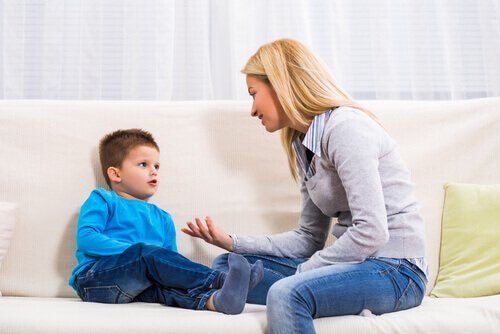Using Tantrums as Learning Opportunities

Your child’s tantrums can tell you that they feel frustrated or emotionally overwhelmed. That’s why identifying when and how they come about will give you clues that’ll help you manage them appropriately. It’s also important to see tantrums as learning opportunities.
Tantrums are going to happen, no doubt. But when the kicking and screaming has ended, an opportunity for learning opens up.
At this time, you can reflect on what happened together with your child. That way you can invite them to think about what other more positive options they might have for dealing with life events. This is a great way to teach better communication and knowledge of their emotions.
In the following article, we’re going to give you various strategies you can use during and after tantrums. These will help you change these situations into learning opportunities and can also help make them more tolerable for you.
“What is done to children, they will do to society.”
-Karl A. Menninger-
How to behave during a tantrum
Stay calm
Losing your cool when your child throws a tantrum may just make things more difficult. That’s because the child may become more stressed because of your anger. Not only that, but you’ll also be setting a bad example for them in terms of emotional control.
The adult’s responsibility is to show the child better ways of managing their frustration. You also want to set a good example in terms of expressing feelings and desires.
As such, it’s very important to keep calm and focus on the child. That way you’ll become a role model for them. They’ll remember your behavior when they have difficulty controlling their emotions. You can use tantrums as learning opportunities.
“When I approach a child, he inspires in me two sentiments; tenderness for what he is, and respect for what he may become.”
-Louis Pasteur-

Don’t take things personally
Generally, when your children have tantrums, they don’t do it to get your attention. Nor do they aim to provoke you or make you angry.
What’s actually happening most of the time is that they’re emotionally overwhelmed by their current situation. They simply don’t know any better way of acting. They feel frustrated or angry and they express it by kicking and screaming.
It’s important that you don’t take the tantrum personally. Just see it as a way of reacting to some event. It’s something that they can learn to manage.
More likely than not, the way you manage your emotions is related to how your parents taught you to do so. That’s why it’s so important to realize that you’re going to be your children’s role model.
It’s possible that your parents took your tantrums personally. They may not have taught you any other way to express your emotions and didn’t use tantrums as learning opportunities. If this is the case, you’ll probably feel many negative emotions during your own children’s tantrums. What’s more, you probably won’t know how to deal with them, either.
“Great persons are great because of good, strong foundations on which they were able to build a character….”
-Montapert-
Be empathetic
It’s essential to be able to empathize with your children and their feelings. You should also put their experiences into simple words. You should do this while using a comforting and calm voice. In terms of body language, try to position yourself so your eyes are level with theirs when you do it. That way they’ll feel like you’re really listening to and understanding them.
Children are actually the ones who suffer the most when they fail to properly channel their negative emotions. Perhaps at that moment, the only tools they have to express themselves are yelling and crying. You have to try to help them with that so that in the future they’ll also know how to behave more appropriately.
On the other hand, empathy doesn’t mean yielding to the tantrum. If you do that, you won’t be offering them the right tools for learning to manage their emotions. On the contrary, you’ll be giving them permission to express themselves through tantrums whenever they want something.
So being empathetic with them means trying to put what’s happening to them into words. For example, you could say “I believe that you’re angry because you were enjoying your game and we had to go.” Another example is “you wanted to put on your shoes alone, but I had to help you and you felt frustrated.”
If you’re able to do this, your child will feel that you’re really understanding them and that’ll help them calm down and listen to you.
Offering them alternative behaviors and helping them change the focus of their attention is also a good idea. This will help them avoid engaging in this behavior again and again. Nevertheless, this works better once they’ve calmed down and feel understood. If you do it right at the peak of their tantrum, you might just cause them more frustration.
“Educate the children and it won’t be necessary to punish the men.”
-Pythagoras-

What to do when a tantrum has ended
Offer a source of restraint
When a tantrum has ended or when your child has calmed down, you can then hug or caress them. You can also invite them to wash off their face and have a drink of water. If they don’t want that, then you can just sit next to them, breathing deep with them. You can then proceed to explain that they can ask for a hug whenever they feel they need it.
In case the tantrum includes self-harm, you have to stop the child from doing that and tell them that it’s unacceptable. If they try to hit you, then you should restrain them firmly (without hurting them) and make it clear that you don’t allow such behavior.
Don’t give in
It’s important not to yield to the child’s demands during the tantrum, even if they’re yelling them out. If you do that, it may only cause your child to use tantrums to get what they want or to express themselves. Nevertheless, you can give them positive attention, caresses, or hugs. This will let them know that you love them no matter what happens.
On the other hand, you can also negotiate and offer the child different options. This is a way to show your children that you are listening to them and taking them seriously.
“There are only two lasting bequests that we can hope to give our children—roots and wings.”
-Hodding Carter-

Take full advantage of tantrums as learning opportunities
Once your child has calmed down, you can talk to them about what’s happened. Let them explain what they feel and try to explain what you’ve observed and how you feel. Also, use this time to brainstorm different alternatives for facing these situations when they occur.
If your children are very young, it’s best to try to express what you think they’re feeling and put it into words. You should also give them the solutions that can help them, at least until you can discover them together.
What shouldn’t you do during a tantrum?
- It’s not appropriate to yell or use corporal punishment.
- Any strategy that provokes more stress can have long-term consequences. As such, you shouldn’t use them.
- Don’t try to give long explanations during the tantrum because your child won’t be paying attention to you anyway.
- It’s not appropriate to leave your children alone in their room or punish them there. That could cause them even bigger problems in managing their emotions.
- If the tantrum occurs in a public place, don’t pull them away or force them to leave the place. Try to manage the situation as soon as possible without worrying about who’s looking or what they’re thinking.
Tantrums as learning opportunities
The tantrum stage is a normal phase in child development. It’s OK so long as they don’t go beyond certain limits. In fact, it can become a good opportunity for them to learn to handle frustrations and express negative emotions. This is something that’s profoundly important for living in a society with norms and limits.

Tantrums allow parents as well as children to strengthen their tolerance for frustration, mistakes, errors, disappointments, and losses. As such, they’re also good opportunities for teaching emotional skills. These will help your children become more mature teens and adults.
All cited sources were thoroughly reviewed by our team to ensure their quality, reliability, currency, and validity. The bibliography of this article was considered reliable and of academic or scientific accuracy.
Daniels, E., Mandleco, B., & Luthy, K. E. (2012). Assessment, management, and prevention of childhood temper tantrums. Journal of the American Academy of Nurse Practitioners. https://doi.org/10.1111/j.1745-7599.2012.00755.x
Leung, A. K. C., & Fagan, J. E. (1991). Temper tantrums. American Family Physician.
This text is provided for informational purposes only and does not replace consultation with a professional. If in doubt, consult your specialist.








